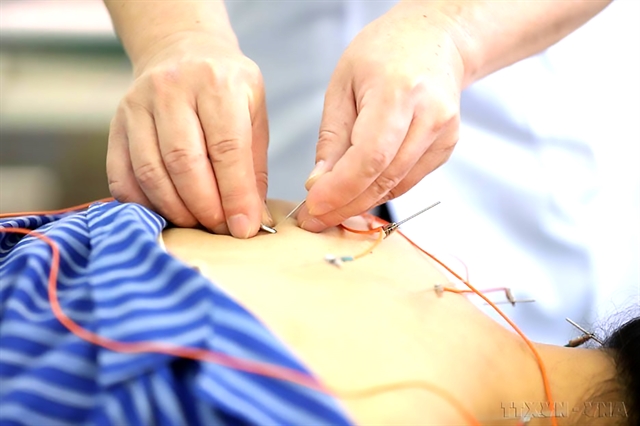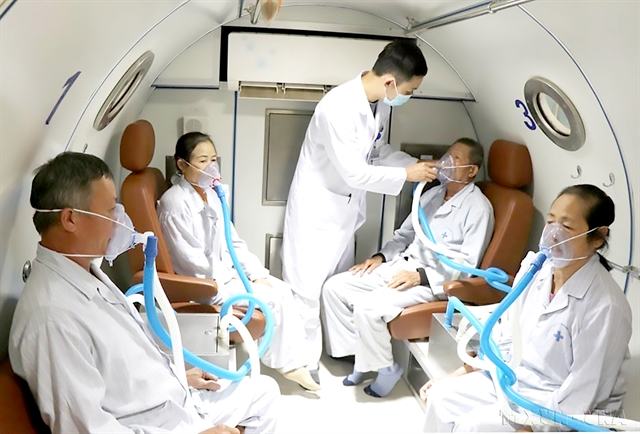 Society
Society

 |
| Using electro-acupuncture method to treat patients at the Lạng Sơn Provincial Hospital of Traditional Medicine. — VNA/VNS Photo Anh Tuấn |
HÀ NỘI — Keeping tradition alive is not only cultural but also clinical, Deputy Prime Minister Lê Thành Long has said, stressing that the development of traditional medicine is both a responsibility and a mission to preserve heritage while meeting the healthcare needs of the people in a new context.
In Directive No 25/CT-TTg, sent to ministries and localities, the Deputy PM stated that traditional Vietnamese medicine is a precious cultural asset of the nation, formed and developed in step with the country’s history.
Recognising its importance, the Party, State and Government have issued numerous policies and strategies to preserve, inherit and develop traditional medicine.
In recent years, Vietnamese traditional medicine has achieved significant and encouraging results. The medical examination and treatment system has been upgraded, the grassroots traditional medicine network has been consolidated and expanded, and services have become more diverse and of higher quality.
To further promote development, Deputy PM Long has directed all ministries, sectors and localities to take action.
Take the lead
The Ministry of Health (MoH) will take the lead and collaborate with the Ministry of Justice to review and study mechanisms and policies suited to the characteristics of traditional medicine to enhance it in line with its inherent potential and strengthen the integration of traditional medicine with modern medicine.
It will continue to develop diagnostic and treatment guidelines and technical procedures for medical examination and treatment, combining traditional medicine with modern medicine, with a focus on strengths such as acupuncture and other non-drug treatments.
The MoH will instruct the research and proposal for investment in building new, upgrading and expanding traditional medicine treatment facilities in accordance with healthcare network planning and the socio-economic development planning of localities.
In addition, the MoH, in coordination with the Ministry of Science and Technology and the Ministry of Finance, will suggest science and technology tasks using State budget funds to study certain traditional remedies and develop products from medicinal herbs and traditional medicines.
The MoH also directs and provides comprehensive professional guidance in developing domestic medicinal resources in an industrial direction.
It will issue maps for planning medicinal plant growing areas at the national and local levels, conserve rare and endemic medicinal plant resources and standardise the processes of cultivating, harvesting, preserving and processing medicinal plants to ensure quality and safety in accordance with international standards, together with the establishment of a digital traceability system to control quality, make the supply chain transparent and serve export goals.
Alongside this, training human resources in traditional medicine should be intensified, especially highly specialised and high-quality personnel, creating conditions for traditional medicine doctors to access modern techniques and thereby improve the combination of traditional and modern medicine.
Information technology and digital transformation applications in traditional medicine must be strengthened.
Priority should be given to digitising valuable materials and documents related to traditional medicine, building a national database on medicinal regions, medicinal ingredients, herbal plants, prescriptions, outstanding practitioners and scientific works to facilitate preservation and easy access.
Localities and units must promote the sharing of information on traditional medicine within their respective areas.
International cooperation activities will also be enhanced, focusing on fields in which Việt Nam has strengths and current needs.
Detailed duty
 |
| A doctor treats patients with high pressure oxygen system at the Thái Nguyên Traditional Medicine Hospital. — VNA/VNS Photo Hoàng Nguyên |
The Ministry of Finance will guide the work of compiling, balancing and allocating budget sources for implementation, ensuring alignment with the State budget’s capacity.
The Ministry of Science and Technology will allocate funds to implement approved science, technology, and innovation tasks in accordance with regulations, paying particular attention to specific issues related to traditional medicine. It will coordinate with the MoH to direct policies on intellectual property protection for traditional medicine prescriptions and treatment methods.
The Ministry of Agriculture and Environment is responsible for effectively managing forest environment leasing activities to develop medicinal herbs and for protecting, exploiting and sharing benefits from medicinal genetic resources.
It must standardise the processes of cultivating, harvesting, preserving and processing medicinal herbs to ensure quality and safety when used, and direct and support the connection of cultivating and trading activities of medicinal herbs and products from medicinal herbs according to the one commune one product (OCOP) model.
The Ministry of Construction should integrate the development of the traditional medicine facility network into urban construction planning, tourism areas, ecological zones and rural development, ensuring consistent infrastructure.
The Ministry of Industry and Trade is responsible for organising trade promotion activities and supporting enterprises in connecting and cooperating with countries in the region and globally to effectively exploit foreign markets.
The Ministry of Culture, Sports and Tourism’s duty is to hold promotional activities for traditional medicine linked with national culture and identity. It will also direct the development of medical and health care tourism utilising traditional medicine while strictly and effectively managing advertising activities related to traditional medicine.
The Ministry of Ethnic Affairs and Religion will effectively implement medicinal herb projects within the national target programme for socio-economic development in ethnic and mountainous areas. It will coordinate with the MoH to conduct surveys, evaluate and transfer traditional medicine knowledge within ethnic groups.
The Ministry of Foreign Affairs will realise international treaties, agreements and plans related to traditional medicine that have been signed. It will support the MoH in executing international cooperation programmes, plans and projects on traditional medicine, as well as introduce the image, brand and value of Vietnamese traditional medicine worldwide.
The Việt Nam Traditional Medicine Association will intensify activities to collect, inherit and conserve effective remedies, precious medicinal plants and treatment methods. It will organise communication and education within the country to ensure safe and effective use.
Provinces and cities are responsible for prioritising local budget allocation to develop traditional medicine. They must issue policies and preferential mechanisms within their authority to promote, encourage and attract social investment in traditional medicine development in their localities. Investment and upgrading of traditional medicine hospitals should be oriented toward modernisation, aiming for each province to have at least one hospital equipped with modern infrastructure and facilities.
Local leaders must organise inheritance, conservation, preservation and reasonable exploitation of valuable medicinal recipes, indigenous medicinal plants and traditional local medicinal herbs, and build a local medicinal herb planning map.
Another important task is integrating the development of traditional medicine into programmes and projects for developing preventive medicine and grassroots health care in the locality.
Local authorities will direct inspections, monitoring and supervision of the cultivation, production and trading of traditional medicines and medicinal herbs, as well as healthcare services using traditional medicine. — VNS




